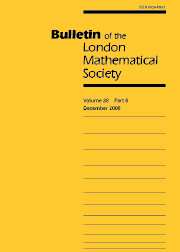Article contents
INTEGRAL GROUP RINGS OF FINITE GROUPS OF LIE TYPE
Published online by Cambridge University Press: 01 January 1999
Abstract
The ‘isomorphism problem for integral group rings’ (IP) is the question whether for two finite groups G and H, the existence of an isomorphism of the integral group rings ℤG and ℤH implies that G and H are isomorphic. Though (IP) is not true in general [4], it is still an interesting question for which classes of finite groups (IP) has a positive solution. In this note, we want to show that (IP) holds for finite groups of Lie type associated to Chevalley groups of universal type.
Note that if U(ℤG) denotes the units of ℤG, and V(ℤG) stands for the units with augmentation 1, then U(ℤG)≅V(ℤG)×U(ℤ), and we can always assume that H[les ]V(ℤG).
- Type
- Notes and Papers
- Information
- Copyright
- © The London Mathematical Society 1999
- 1
- Cited by




